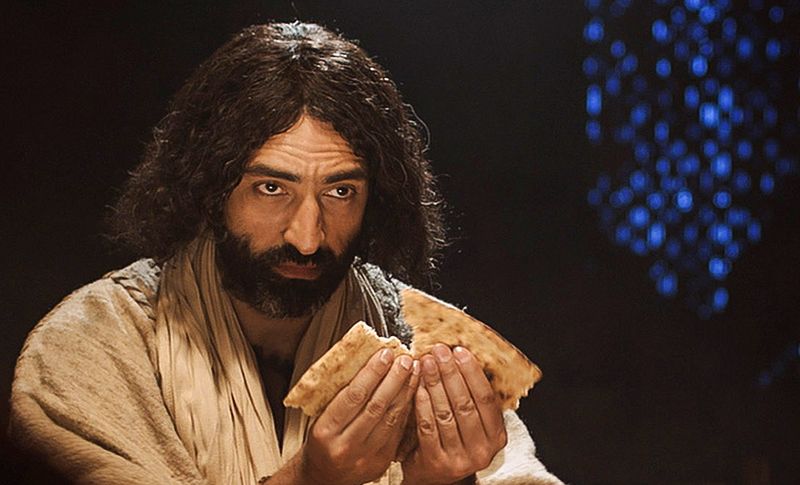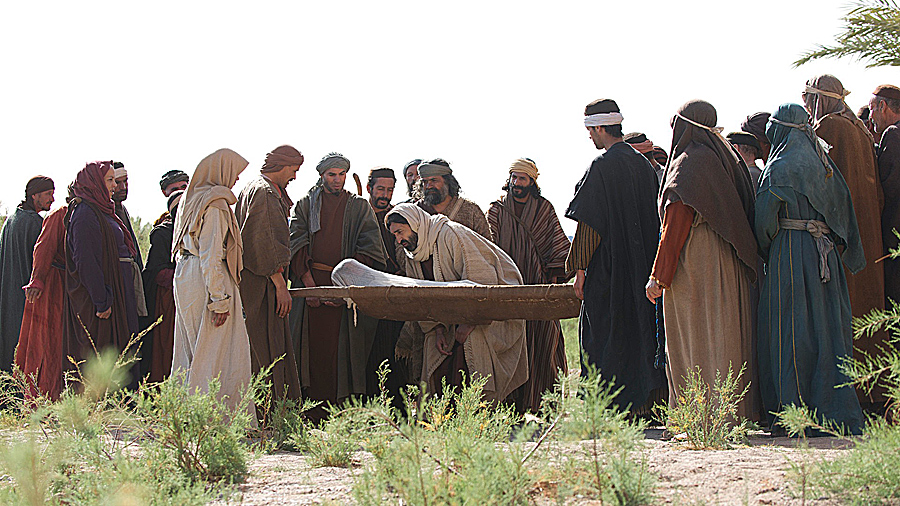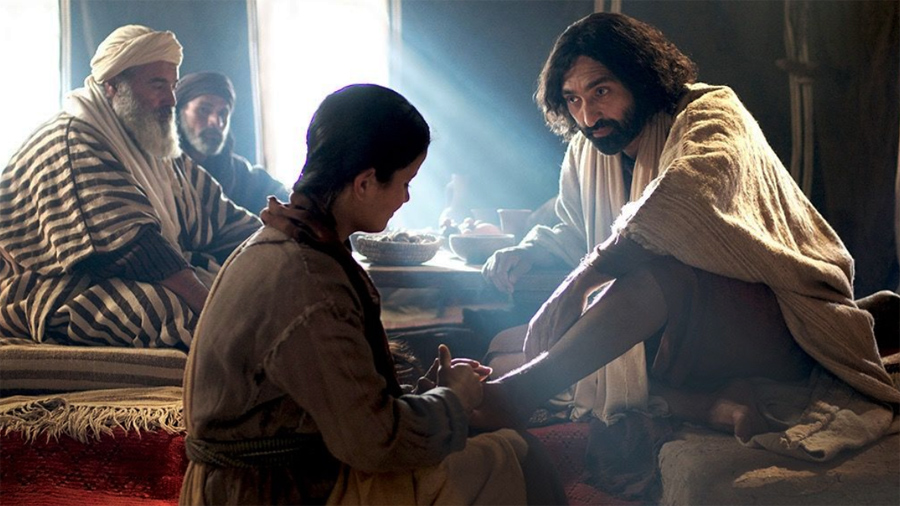 Scripture:
Scripture:
[Jesus] replied, “You give them something to eat.”
They answered, “We have only five loaves of bread and two fish — unless we go and buy food for all this crowd.” (About five thousand men were there.)
But he said to his disciples, “Have them sit down in groups of about fifty each.”
The disciples did so, and everyone sat down. Taking the five loaves and the two fish and looking up to heaven, he gave thanks and broke them. Then he gave them to the disciples to distribute to the people. They all ate and were satisfied, and the disciples picked up twelve basketfuls of broken pieces that were left over (Luke 9:13-17).
When the hour came, Jesus and his apostles reclined at the table. And he said to them, “I have eagerly desired to eat this Passover with you before I suffer.”
…
And he took bread, gave thanks and broke it, and gave it to them, saying, “This is my body given for you; do this in remembrance of me” (Luke 22:16-17, 19)
Reflection:
When Jesus shared a meal with his followers, he gave thanks and then broke the bread and passed it to others to share. At a common meal on the night of Jesus’ resurrection Sunday, the disciples on the road to Emmaus could describe “how he was known to them in the breaking of the bread” (Luke 24:35 ESV). Paul would later add, “And is not the bread that we break a participation in the body of Christ?” (1 Corinthians 10:16).
As we gather around the Lord’s Table, we break bread and drink wine. What we share goes way beyond bread and wine. This breaking of bread is a holy moment and a sacred experience. We would do well to pause and think a moment or two about this bread that is broken and why it is broken.
This breaking of the bread can be so much more than just symbol, custom, language, and idiom. Something about our brokenness connects deeply to the bread that is broken. We acknowledge our world is tragically broken and enslaved to the power of sin and death. We confess our own brokenness without the gift of God’s grace. We remember the brokenness of Jesus’s body as he faced his torturous route through betrayals, trials, denials, beatings, and crucifixion to the empty tomb. We recognize the brokenness of Jesus’ friends as they saw him die and saw all their dreams shattered.
Praise God! All of this brokenness is absorbed and transformed by the Lord’s triumphant victory over hell, sin, and death when he rose from the grave (1 Corinthians 15:56-58). We celebrate this victory as we celebrate The Supper as the earliest Christians did: we take the broken bread on the first day of the week, Sunday, the day of Jesus’ resurrection (Acts 20:7). Brokenness is absorbed in new life, new hope, and the promise of a better day!
Yes, our world is still broken and sometimes breaks us and those we love.
Yes, sinful people still break our hearts and our hopes.
Yes, we can become discouraged in our brokenness and want to give up or even, like Jesus, feel abandoned by God (Mark 15:34).
So, we break the bread. We break the bread as more than just a symbol and an idiom we repeat. We break the bread to remind us that this broken bread is for broken people. We break the bread because of the triumphant love of Jesus that allowed himself to be broken by the same mortal humanity we wear. We break bread on the day of his resurrection to remind ourselves that he has triumphed through his brokenness to become our Lord and pioneer (Hebrews 2:10; Hebrews 12:1-2). We break bread to remind us who is welcome at The Table — broken people.
The healing in the broken bread is for those who are broken by life’s harshest blows. This healing is also for those broken by their own sinful choices. This healing is powerfully demonstrated in one chapter where we meet three very different people — very broken people.
We first meet a Centurion who is a good man. The Centurion deserves Jesus’ favor because of his rank and his character (Luke 7:1-10). His servant is very ill, and he longs for Jesus to speak healing into the servant’s life. Jesus does!

We next meet a widow, utterly broken by the death of her son (Luke 7:11-17). She is alone and powerless. So, Jesus raises her son from the dead, and in the beautiful language of Luke, “Jesus gave him back to his mother.”
We also meet a woman broken by her life of sin. She intrudes into a meal at a table where Jesus is invited. She comes to share her extravagant love for Jesus who has saved her from her desperate slavery to her brokenness. While others look down on her, Jesus affirms her faith and blesses her with a life of peace (Luke 7:36-50).
The bread is broken because this bread, this gift of Jesus’ body we hold, was broken. It was broken so we can know that salvation, grace, healing, and Jesus are reachable in our brokenness (Hebrews 2:14-18; Hebrews 4:14-16). When are broken by fear because of the diseases that afflict those we love, we are welcomed by the broken bread. When we are broken by the loss of a loved one to death, we are welcomed to the table of grace that anticipates the great reunion feast of glory. When we are broken by our sin and its consequences, we are welcomed by Jesus to his table to be forgiven, transformed, and sent back out into the world with his peace.
The bread is broken. So are we. Broken people are welcome here — not to wallow in their brokenness, but to rejoice in a Savior who understands it, heals it, and promises us life beyond our brokenness. Our Lord sends us away from this table with his peace to invite other broken people to come to The Table with us so they can…
Taste and see that the LORD is good;
blessed is the one who takes refuge in him.
(Psalms 34:8).
Prayer for the Bread:
Thank you, Father, for this simple meal that means so much to us. Thank you, Lord Jesus, for breaking the bread whenever you shared it. We see so much depth of meaning in the brokenness this bread represents — your sharing our brokenness by being one of us, humanity’s brokenness in rejecting and crucifying you, and our brokenness as we come to The Table. We ask that the Holy Spirit draw us close to your brokenness through this bread so our brokenness can be healed with hope. Thank you for being accessible to us when we are broken. Thank you for giving us a message of hope to share with those that we love who face brokenness in their lives. We remember Jesus and rejoice in his grace through this bread which we now break together. Amen.
Prayer for the Cup:
Almighty God, we recognize that you are eternal, incorruptible, and immortal. And this wine, this fruit of the vine, is our reminder of your grace to enter our world of flesh and blood as one of us. We remember the gift, sacrifice, and hope that is ours in Jesus as we share in this cup together. In the mighty name of Jesus, we thank you. Amen.

© Phil Ware. All rights reserved.














